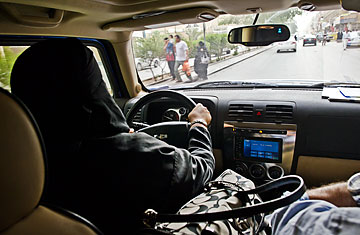
A Saudi woman in Riyadh during a protest that took place on June 17
(2 of 2)
In fact, while the women's campaign to drive may have friends abroad, in Saudi Arabia it has proved deeply divisive. Women's-rights activists are conflicted over the impact of acts of civil disobedience in a society uncomfortable not only with dissent but also with women in the public eye. The modern nation of Saudi Arabia has emerged only recently from an intensely conservative Bedouin culture that traditionally kept female family members concealed within the home. When the country started urbanizing in the 1960s, women adapted by wearing the face-covering niqab in public. While more-liberal women may now show their faces, the majority of the population continues to cover up out of modesty. So the sight of Saudi women on YouTube has been too much for some to bear. "This kind of activity is not part of our culture," says al-Oweardi. Many Saudi women, whose families are wealthy enough to afford drivers, don't see driving as a priority. "We are our own worst enemy in terms of emancipation," says Riam Darwish. She supports women's right to drive but says she won't join the protest. "If I get caught, it could harm my family. I have too much to lose." Paradoxically, the women who would benefit the most from being able to drive are members of the more conservative lower classes. "The actual change in driving will have to come from the women who can't afford drivers," says Darwish. "But they are the ones who believe that women shouldn't drive the most."
The King, for his part, has declared driving by women a "social" issue and has said it is up to the public to decide what to do about it. But there is no clarity on how the public could do so: while municipal councils are now elected (though women still can't vote), there is no space for Saudis to weigh in on national issues like driving. Some right-to-drive campaigners, fearing that the majority is against the idea, would rather see a royal decree like the one the King's half brother King Faisal issued in the 1960s, declaring that girls could go to school. Some observers say King Abdullah is waiting before he tackles a subject considered toxic to conservative clerics. "I do think he wants the same thing we want," says Princess Ameerah al-Taweel, vice president of the Alwaleed Bin Talal Foundation, which focuses in part on women's advancement. "He is for women's empowerment."
This year's protests are not the first. In 1990, 47 women drove through Riyadh in a formal demonstration. They were all arrested, they all lost their jobs, and they — and their husbands — were barred for a year from leaving the kingdom. To this day, the Drivers, as they are known, face discrimination. Some argue that the protest set the women's movement back, forcing the clergy to issue religious rulings condemning driving that were then codified into government edicts. "We need evolution, not revolution," says the princess, who supports the initiative but doesn't think the protest should be confrontational.
Conservatives and campaigners for the right to drive would at least agree on this: Allowing women to drive is about more than getting from point A to point B. It's a symbol of more profound changes that could fundamentally alter Saudi society. For conservatives, who believe it is ordained by God that women stay in the home and take care of the family, it means a loss of control over women's lives and the acceptance of their greater independence. For some women's-rights campaigners, driving is a stepping-stone to other freedoms.
At present, Saudi women cannot leave the country without permission from a male guardian. They cannot take out loans without having two men vouch for their identity, even if they carry government-issued IDs. Custody laws automatically favor the father. Tackling those issues is far more difficult than taking on the prohibition on driving, says Fawzia al-Bakr, one of the original Drivers in 1990. "Driving means access, mobility and empowerment, and from there we can chip away at the bigger issues," she says. "If we can drive, anything is possible."
Not all activists agree. "The domino effect doesn't work in Saudi Arabia," says Muna AbuSulayman, who recently gave a talk at a forum on women's rights in Saudi Arabia. She fears that allowing women to drive would simply become a sop to the demands of Western governments and Saudi liberals without fundamentally altering women's role in society. "You have to wonder, What's the point of being able to drive if you can't leave the country on your own? Women in many instances are treated like second-class citizens, children almost. All these core issues have to be dealt with first. And if we check the driving box off, they won't be."
A better solution, says Najla Hariri, an unassuming housewife in Jidda, on the country's west coast, is to stop making a fuss. Her husband, a pilot, is often away. And if the family driver doesn't turn up for work, she takes the car keys. She doesn't see herself as particularly brave or heroic. "I am just a mother taking my kids to school. I am not trying to challenge the government," she says with a shrug. "I just got tired of waiting."
Social change, Hariri seems to be saying, doesn't always have to come from campaigns or conflict. Sometimes it creeps in when one woman decides to do something without asking for permission. Or when another gets a traffic ticket instead of a prison sentence.
